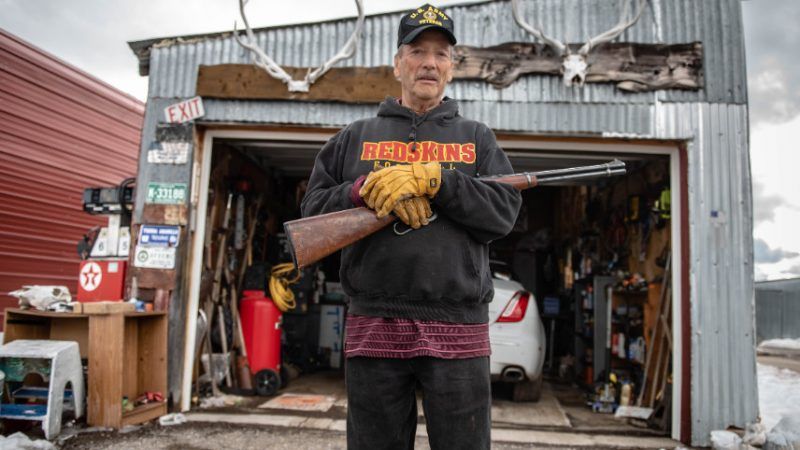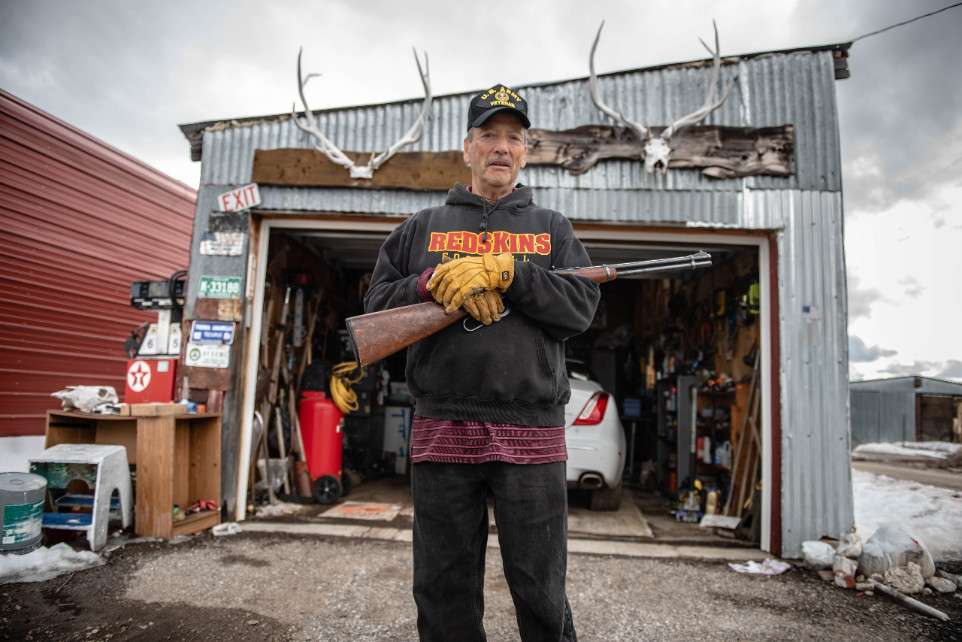Popular Defiance Will Kneecap Gun Laws in New Mexico, As It Has in Other States
Following the lead of their rebellious constituents, local officials say they won't enforce despised rules.


New Mexico is the battleground for the latest confrontation between politicians determined to impose legal restrictions on the right to acquire and own the means of self-defense and people unwilling to obey such laws. The state's governor is publicly feuding with county-level officials who, responding to grassroots anger at the proposed gun measures, vow noncompliance if they become law.
The evidence from similar spats in other states suggests that government officials are once again poised to have their impotence demonstrated by people eager to disobey dictates from above.
Mandatory background checks for most gun transfers, court-ordered seizures of firearms, and the denial of self-defense rights to those convicted of domestic violence offenses feature in the bills moving through the state legislature. The measure requiring background checks for all gun transfers, except between close family members and cops, seems to have excited the greatest opposition.
"The gun-related measures have drawn opposition from all but a few of the state's 33 county sheriffs," the Albuquerque Journal notes. "In addition, at least 24 counties have passed 'Second Amendment sanctuary' ordinances in opposition to the legislation pending at the Roundhouse." The Quay County resolution, as an example, dedicated county officials "to support decisions by our Sheriff to not enforce any unconstitutional firearms law against any citizen."
In response, Gov. Michelle Lujan Grisham, a Democrat, slapped back at what she called "rogue sheriffs throwing a childish pity party." That's probably not the sort of language likely to win over the rebellious, largely rural residents to whom county officials are catering.
Confrontations of this sort in other states—including Colorado, Washington, and even New York—resulted in the kneecapping of intrusive firearms restrictions. And comprehensive background check (CBC) laws in Colorado, Delaware, and Washington produced an increase in such checks only in Delaware, researchers from the University of California-Davis reported in a study published in 2017 in Injury Prevention.
"One plausible explanation for our findings is low compliance in our study states," the researchers wrote, continuing:
In Washington, there was a well-documented public "I will not comply" rally at the state capital, at which firearms were openly transferred between private parties without background checks. There were also gun shows where non-compliance was encouraged and public calls from profirearm organisations to not comply with the state's new CBC policy… Many county law enforcement officials in Colorado reportedly stated they would not enforce its CBC law, and some retailers were declining to process background checks for private party transfers.
In each state, noncompliance was a result of widespread local opposition to the law. Spurred by their communities, sheriffs in Washington also refused to enforce the background check requirement, and more than half have vowed to ignore new gun laws passed last year. And the rebellion among Colorado sheriffs, who are elected to office there as in most states, came in response to local sentiment of the sort that turfed-out lawmakers who supported gun restrictions.
Which is to say, the "low compliance" in both Colorado and Washington was the result of grassroots defiance, with local officials following their rebellious constituents, not leading the way.
Sheriffs in rural New York counties also responded to constituents' hostility to tightened gun laws—in their case, registration of semiautomatic rifles.
"The New York State Sheriffs Association and five individual sheriffs have joined a court effort to block enforcement of new bullet limits for magazines and firearms restrictions," the Daily Star reported in 2013. "Schoharie County Sheriff Tony Desmond said he has no intention of enforcing the law, and that his office won't do anything that would cause law-abiding citizens to turn in their weapons or arrest them for possessing firearms."
Compliance with the state's registration law topped out at about five percent, with the tiny law-abiding minority heavily concentrated in the New York City area.
Interestingly, local defiance of state and federal gun restrictions appears to reflect a desire for freedom from unpopular legislation that extends across the political spectrum. The specifics of the laws to be defied vary from place to place, but the desire to be left unmolested by other people's rules seems nearly universal.
"The 'Second Amendment sanctuary county' concept … was borrowed from activists who for several years have convinced some local governments to declare themselves 'sanctuary cities' for undocumented immigrants — meaning local law enforcement won't help federal officers arrest those whose only crime is being in the country illegally," according to the Santa Fe New Mexican.
Definitions of "sanctuary cities" vary, but "there are over 200 jurisdictions, including some of the largest in the country, that refuse to honor [Immigration and Customs Enforcement (ICE)] detainers," ICE Director Sarah Saldaña told Congress in 2015.
Some of us remember, with particular fondness, Norman Vroman, who served time for failing to pay income taxes before being elected, as a Libertarian, to the office of district attorney for Mendocino County, California. Because of his hands-off policy towards marijuana and guns, Vroman "was endorsed by such disparate groups as the National Rifle Assn. and the Green Party" as reported in his Los Angeles Times obituary.
Vroman's battles with state and federal officials (the feds were planning a raid on his home at the time of his death) were made possible by a local culture contemptuous of legal restrictions imposed from above—especially those on marijuana.
Restrictive laws can be unenforceable even if sentiment isn't sufficiently monolithic to drive local officials to butt heads with officeholders further up the political food chain.
In the absence of registration lists of guns and gun owners, which don't exist in most of the United States (and failed from popular defiance in New York, as mentioned above), the background checks causing so much fuss in New Mexico depend entirely on voluntary compliance. If only two people in a jurisdiction oppose such requirements, those two can safely buy and sell guns to each other so long as they conduct their transactions out of sight of law enforcement.
Expand the population of eager scofflaws and you're bound to see widespread noncompliance, as in Colorado, New York, and Washington. New Mexicans seem poised to demonstrate, once again, just how powerless politicians are over defiant people.


Show Comments (203)